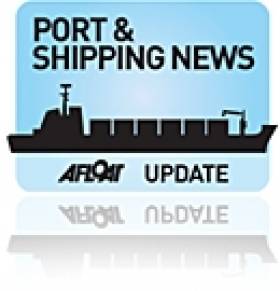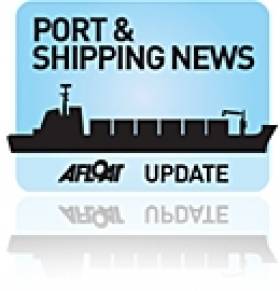Displaying items by tag: Guinness 'Tanks' cargoship
Snow Flurry Send off as Guinness Tank Cargoship Sets Sail
#GuinnessTankShip – Amidst snow flurries and gusts up to 34 knots, cargoship Blue Tune departed Dun Laoghaire Harbour today, having discharged a final round of fermentation tanks yesterday for Guinness, writes Jehan Ashmore.
The vessel registered in St. John's in Antigua and Bermuda, was the third vessel to dock in Dun Laoghaire Harbour since mid-February. These vessels represented the return of cargo ship activity, a trade not witnessed in the port for more than two decades.
Combined the 'project' cargo consisted of three batchs of large stainless steel fermentation tanks weighing up to 30 tons each. They are to be installed as part of a €153m plant upgrade at the Guinness St. James's Gate Brewery facility close to central Dublin.
As the 3,845 tonnes Blue Tune headed out through the harbour mouth she set a course for the North Burford Buoy and then the 2010 built vessel veered for the Kish Bank bound for Cardiff.
At the same time Stena Line's HSS Stena Explorer was making an inbound sailing from Holyhead having rounded the South Burford Buoy.
Ports & Shipping Review: Ardmore Name Tankers, Maersk Opt for Suez, Ireland’s Globalised Status, Short-Sea ‘Steady’ and Last Guinness Tanks
#ShippingReview – Over the last fortnight, Jehan Ashmore has reported from the shipping scene, where Cork based Ardmore Shipping named two of their latest newbuild product chemicals tankers at a South Korean shipyard.
According to the IMDO's Weekly Shipping Market Review, Maersk Line, is looking to change its path for the trade lane of Asia to US East Coast, by opting for the Suez Canal as opposed to the current Panama Canal.
In addition the IMDO review reports that Ireland has been ranked the world's third most globalised economy in terms of GDP, and the most globalised nation in the western world, according to Ernst and Young. As for the European Short Sea Market, this has been summarised as "steady/flat", according to HC Shipping & Chartering".
The cargsoship Blue Tune (2010/3,845grt) which currently is docked in Dun Laoghaire Harbour, is understood to have arrived with the final batch of fermentation tanks bound for the Guinness brewery plant in Dublin.































































